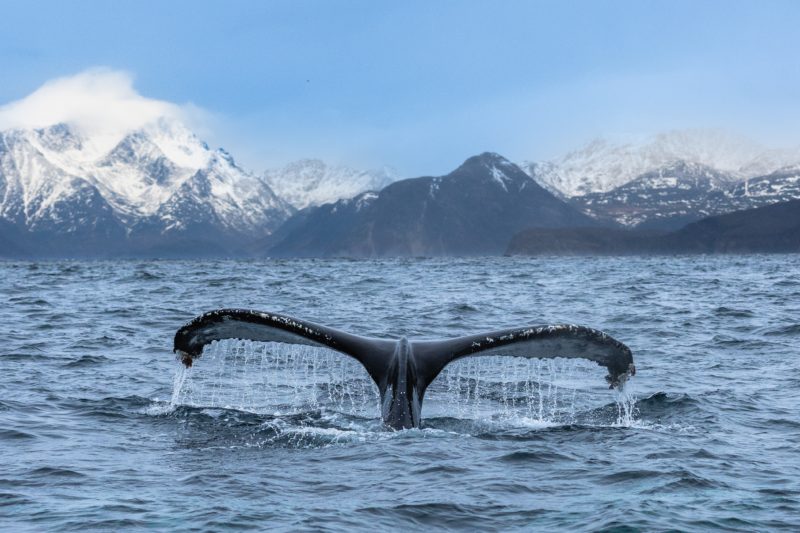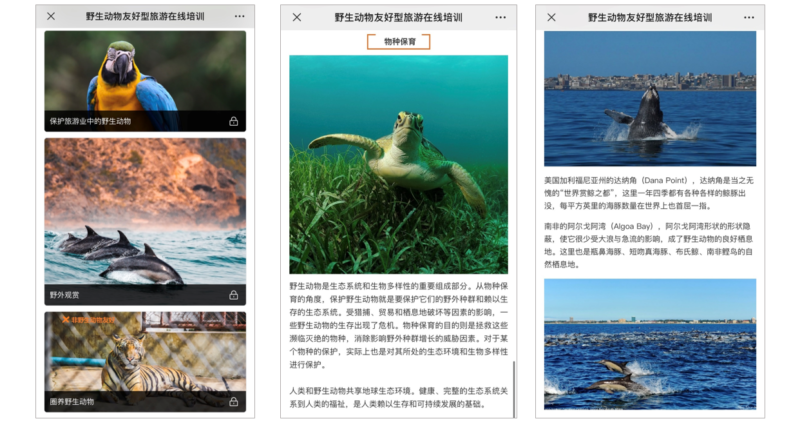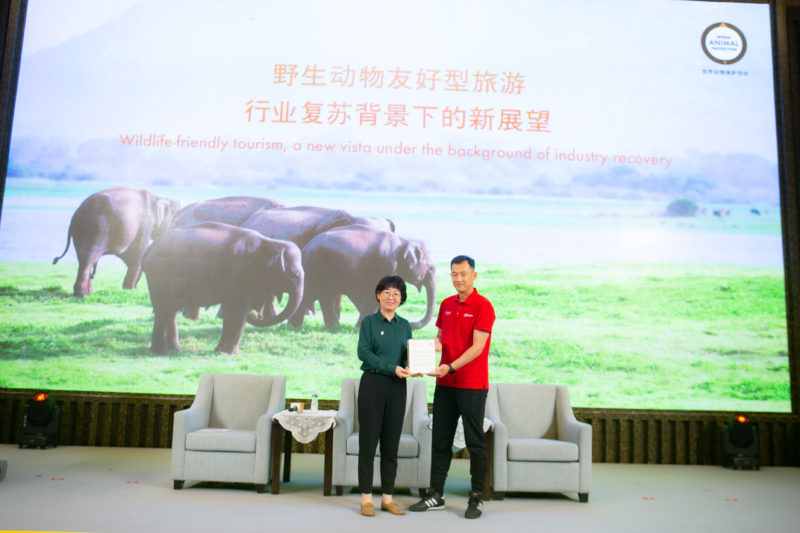
Photo by Felix Rottmann on Unsplash
In May 2023, World Animal Protection presented its new Real Responsible Traveller Guide at the Guangzhou International Travel Fair (GITF), with a live streamed event featuring research partner University of Surrey, and an additional session as part of the China Outbound Tourism Conference. Dragon Trail caught up with World Animal Protection’s Wildlife Campaign Manager Yu Zheng to learn more about the organization’s recent work to assess and train the global and Chinese travel industry on the importance of wildlife protection.
Tell us about the top findings from your new study with the University of Surrey.
The Real Responsible Traveller Guide builds on World Animal Protection’s 2020 Tracking the Travel Industry, which assessed leading tourism companies globally. The report shows that five industry giants (GetYourGuide, Klook, Traveloka, Trip.com, and TUI/Musement) are failing wild animals by selling and promoting harmful and exploitative wildlife entertainment as travel “experiences”, including elephant rides, selfies with tiger cubs, and dolphin shows. While several tourism companies assessed are taking commendable steps to become truly wildlife friendly, some laggards are still selling harmful experiences that exploit wildlife and sustain the demand for damaging tourism practices and have not acknowledged any of the responsibilities that they, and their industry, have towards animal exploitation and the dangers of wild animal/tourist interaction.

World Animal Protection’s Wildlife Campaign Manager Yu Zheng presents at the Guangzhou International Travel Fair
Which travel companies are doing the best to protect wildlife?
Airbnb, Booking.com, and The Travel Corporation have proactively removed all captive wildlife entertainment. Tripadvisor/Viator have removed ticket sales for captive wild animal entertainment, but continue to promote exploitative wildlife tourism through images and reviews on their website.
All four of these companies have invited advice from World Animal Protection to improve their commitment to rejecting animal exploitation and wildlife friendly tourism, and all scored between scored between 44% and 75% in the independent assessment of their commitments to wildlife in the tourism industry. These scores are a testament to the steps these companies have already taken to protect animals.
What are the most important steps that travel companies can take to protect wildlife?
The first and most important step is, companies cannot sell tickets to or promote any wildlife entertainment activities, including but not limited to wild animal performances, swim-with experiences, rides, selfies, or petting of any wild animal species.
Then companies would also need to have implemented ‘best practice’ across the four categories in the University of Surrey’s assessment. This includes having a comprehensive, publicly available policy that completely prohibits wildlife entertainment for all wild animal species; adopting best quality standards for activities and venues; transparency about sales; having agreements in place with suppliers that prohibit wild animal exploitation; educating and training suppliers and customers; and setting a positive industry standard by working with partners and promoting clear guidelines.
What role do travel agents and/or OTAs really have in influencing traveler behavior and promoting wildlife protection among Chinese tourists? Can you give some examples?
Travel companies are intermediaries between tourists and venues – they are influential to both sides. From the tourists’ side, travel companies provide information and accessible options for their customers, and sometimes they are even like experts to give suitable suggestions. Therefore, there is a responsibility for them to tell their customers the truth behind the scenes, that wildlife entertainment activities are harmful and exploitive to animals, so their customers can make informed choices to decide if they want to be involved in these exploitive activities.
For example, QYER is a well-known Chinese travel platform that focuses on outbound tourism. On advice taken from World Animal Protection, they have phased out all wildlife entertainment products on their website, and added tips in their destination guides to inform tourists which activities are harmful to animals. QYER also works with NGOs to increase tourists’ awareness to protect wildlife on many important animal protection days. What QYER has done strengthened the linkage between wildlife protection and responsible tourism, and expanded the audience reach through their influence.
What does World Animal Protection do to engage and train the Chinese travel trade?
We participate in several influential travel trade fairs regularly, through presentations, panels or booth talks to have direct engagement with the local tourism industry, providing them with facts and trends related to wildlife tourism, and encourage more travel companies to be wildlife-friendly.
Currently, there are 21 Chinese travel companies on our wildlife-friendly travel company list, meaning they won’t sell any wildlife entertainment product like wildlife performances or close interaction with wildlife, and they will provide customers, if possible, with responsible wildlife offerings where the animals are in the wild, at genuine sanctuaries or wildlife-friendly settings.
In addition, working with China Travel Academy, we launched an online course to provide useful information to tourism industry practitioners on how to operate wildlife tourism ethically. Now, near to 2,000 people have participated in this course and given us much positive feedback.

World Animal Protection’s course on Dragon Trail’s China Travel Academy platform
What are the biggest changes in Chinese travel behavior that you’ve noticed during your time working in this field, and specifically since the start of the pandemic?
We are closely observing the wildlife tourism market in China. Through quantitative and qualitative research conducted by leading research institutions, we have many interesting findings about the behavior changes in this market. For instance:
– Chinese millennial tourists are more friendly to wild animals, both in attitude and actual behavior. They would like to avoid activities involving animal abuse, and choose more authentic and natural places to watch wild animals. In a 2019 survey, more than 80% of Chinese young people responded that they had participated in wildlife watching or visited wildlife sanctuaries in their outbound trips.
– Some wildlife entertainment activities are less popular in Chinese outbound tourism now. For example, Chinese tourists who ride elephants and watch elephant shows in Thailand dropped by 13 percent and 26 percent, respectively, from 2016 to 2019.
The pandemic did not have a huge influence on the wildlife tourism market or people’s willingness to participate in wildlife tourism. However, it has driven concerns about the environment and safety of animals, and a resistance to the consumption of wildlife. In the post-pandemic era, wildlife tourists seem to pay more attention to the safety of wild animals and their living environment, as well as their own safety during their tours, especially from a public health angle.

Signing a MOU on wildlife-friendly tourism at the Guangzhou International Travel Fair
We still see lots of trained-animal shows – particularly marine mammal performances – being promoted to Chinese tourists on travel websites and through social media. What are you doing to educate the trade and consumers about the harm of this kind of entertainment?
Sure, exploitive wildlife entertainment activities have many ways to reach people, including on social media. So we need to raise awareness and also change people’s attitude and acceptance of such kind of activities in many ways.
Internationally, we have worked with Instagram and YouTube, to adopt some actions. We initiated global campaigns to further engage supporters who want to take actions to help wild animals exploited in the tourism industry, for example to choose responsible travel companies on their next trip. In China, we delivered online and offline activities to reduce consumer demand for those harmful wildlife entertainment activities and encourage them to become wildlife friendly travelers.
Sign up for our free newsletter to keep up to date on our latest news
We do not share your details with any third parties. View our privacy policy.
This website or its third party tools use cookies, which are necessary to its functioning and required to achieve the purposes illustrated in the cookie policy. If you want to know more or withdraw your consent to all or some of the cookies, please refer to the cookie policy. By closing this banner, scrolling this page, clicking a link or continuing to browse otherwise, you agree to the use of cookies.